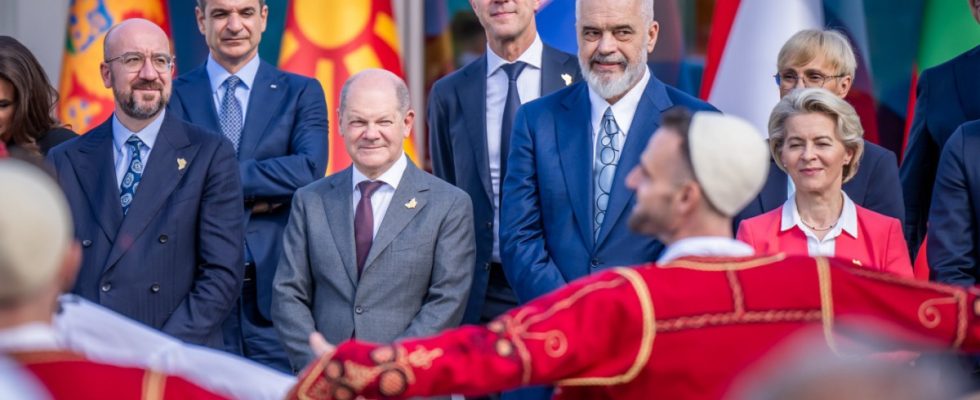Albania’s Prime Minister Edi Rama jokes about “a bit of inevitable light propaganda” with which he welcomed the heads of state and government to the Western Balkans summit in the capital Tirana. It was a video about the country’s history, intended to remind people of how long it has come from an isolated communist dictatorship to an EU candidate country. The Prime Minister has invited people to a white concrete pyramid with stairs to the top, which is right next to his official residence. Once planned as a mausoleum for the dictator Enver Hoxha, who died in 1985, it will be converted just in time for the summit and will now serve as an innovation center.
Albania is the first among the Western Balkan states, which also include Bosnia-Herzegovina, Kosovo, Montenegro, North Macedonia and Serbia, to host a summit meeting in the format of the Berlin Process. Germany initiated it in 2014 under Chancellor Angela Merkel (CDU) together with the EU Commission and other member states in order to promote practical, especially economic cooperation among the six states and at the same time bring them closer to the EU. Chancellor Olaf Scholz (SPD) sees his trip to Tirana as a sign that the process “makes sense and is making good progress.”
The federal government wants to make the process a success, which is one of the reasons why Scholz stuck to attending the summit despite the war in the Middle East, especially since he wanted to address possible escape routes via the Balkans in bilateral talks. In Berlin, in light of the Russian war of aggression against Ukraine, people see a historic, possibly unique opportunity to stabilize the region with around 19 million people and bind it to Europe – and thus push back Russia’s influence and also China’s advances. The strongest argument for this is the economic attractiveness of the EU internal market.
The frustration of the candidate countries
The Chancellor recalled that the six countries were promised accession to the EU 20 years ago. That’s why it’s very, very clear that “it has to happen soon.” EU Commission President Ursula von der Leyen says the summit sends “a strong message about how committed we are to enlargement.” Albania’s Prime Minister Rama, on the other hand, complains that although the countries have initiated many changes, EU accession is based on the motto “all or nothing”, meaning that candidate countries are not gradually enjoying the benefits of membership.
The other countries largely share the frustration. However, crises between countries in the region and domestic political problems endanger the entire rapprochement process. Efforts will be increased to ensure that “Kosovo and Serbia have a common perspective” in the EU, says Scholz. But the latest escalation must be taken very seriously. Serbian irregulars had lured a police unit into an ambush in northern Kosovo, which is predominantly inhabited by Serbs. A police officer and three attackers were killed. It was the most serious incident since the end of the war – so serious that the NATO-led KFOR protection force is being reinforced and equipped with heavier weapons.
Serbia and Kosovo should de-escalate
Scholz calls on Belgrade and Pristina to contribute to de-escalation. Progress had previously been possible in rapprochement with a basic agreement that describes “how the path to normalization can take place.” He thus draws a comparison to the agreement of the same name between the Federal Republic and the GDR, which envisaged relationships below mutual state recognition. Only at the end of the process, upon joint accession to the EU, would Serbia have to recognize Kosovo, which it considers a breakaway province. Both sides must return to this process.
Serbian President Aleksandar Vučić announced this. Unlike the foreign ministers’ meeting ten days ago, Prime Minister Ana Brnabić is standing next to Kosovo’s flag in the family photo. However, Vučić has also announced new elections, which could prove to be an obstacle. Nevertheless, it is said in Berlin that Kosovo’s Prime Minister Albin Kurti must now move – specifically, push forward the creation of a Serbian community association in the north. Kurti, however, again called for sanctions against Serbia. In Bosnia, Serb leader Milorad Dodik is blocking progress, but without the necessary reforms, as von der Leyen and Scholz make clear, the country cannot achieve the status of an official candidate country.
The EU is now enticing with a growth pact: Access to the internal market should be greater in seven areas if the reforms progress, explains von der Leyen. The EU will also invest more – six billion euros in total, four billion of which will be in the form of loans. This means that something fundamental has changed in the relationship between the Western Balkan states and the EU, something we would not have dared to dream of just a few years ago, says Rama.
According to von der Leyen, the economies of the EU and the Balkan states are still too far apart. This should change through so-called mobility agreements. Three of them have already been signed and ratified by Montenegro and Bosnia-Herzegovina. They provide, for example, freedom to travel with your ID card and the abolition of roaming fees for cell phones. Now there is another one about the mutual recognition of school and professional qualifications. These agreements, Scholz praises, would promote regional cohesion and help resolve long-simmering conflicts by building trust.

